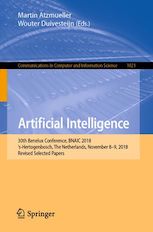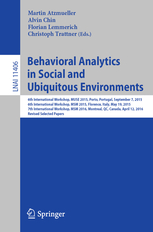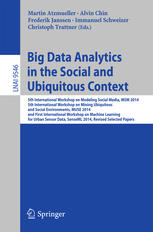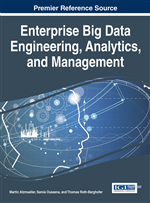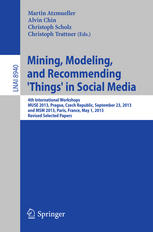
Professor at Osnabrück University
ROSEN-Group-Endowed Chair of
Semantic Information Systems
German Research Center for
Artificial Intelligence (DFKI)
- Scientific Director -
Research Department
Plan-Based Robot Control
Univ.-Prof. Dr. rer. nat. habil. Martin Atzmüller
Institute of Computer Science
Wachsbleiche 27
49090 Osnabrück
martin.atzmueller@uni-osnabrueck.de
Google Scholar Profile
DBLP Profile
Martin Atzmueller is Full Professor (W3, tenured) at the Institute of Computer Science at Osnabrück University (Germany), where he holds the ROSEN-Group-Endowed Chair of Semantic Information Systems and heads the Semantic Information Systems research group.
Professor Atzmueller is founding spokesperson of the Joint Lab on Artificial Intelligence and Data Science and founding member of the Research Unit Data Science at Osnabrück University, as well as Scientific Director - Research Department Plan-Based Robot Control - at the German Research Center for Artificial Intelligence (DFKI). Previously, he also held appointments at Tilburg University (The Netherlands) as an Associate Professor, and at the Université Sorbonne Paris Nord (France) as a Visiting Professor.
He earned his habilitation (Dr. habil.) in 2013 at the University of Kassel, where he also was appointed as adjunct professor (Privatdozent). Further, he received his Ph.D. (Dr. rer. nat.) in Computer Science from the University of Würzburg in 2006. He studied Computer Science at the University of Texas at Austin (USA) and at the University of Würzburg where he completed his MSc (Diplom-Informatiker Univ.) in Computer Science.
Research
Martin Atzmueller's research interests include Artificial Intelligence, Knowledge Discovery, Machine Learning, Network Science and Pattern Mining, also with a human-centered data science and system design perspective. His work focuses on how to 'make sense' of complex information and knowledge processes - leveraging the massive amounts of data collected in science and industry by intelligent analytics and semantic interpretation. A major focus lies on data analysis and machine learning on complex data such as graphs, networks, and temporal data, often encountered in complex systems. For instance, this includes the identification of interesting/exceptional patterns and structures, predictive modeling, analysis and exploration of complex heterogeneous and multi-modal data, as well as human-centered decision support.
By connecting computational approaches with the human cognitive, behavioral, and social contextual perspectives - thus linking technologies with their users - the goal is to augment human intelligence and to assist human actors in all their purposes, both online and in the physical world.
Selected Publications
Slides of Recent Tutorials
WWW 2018: Mining Attributed Networks
DSAA 2017: Mining Attributed Networks
Web Science 2016: Community Detection: From Plain to Attributed Complex Networks
ASONAM 2015: Subgroup Discovery and Community Detection on Attributed Graphs
CSSWS 2015: Subgroup and Community Analytics
Recent Projects/Activities
FRED: Artificial Intelligence and Trusted Edge Computing for freshness data management - from Farm to Fork on the Edge (funded by BMWK: Federal Ministry for Economic Affairs and Climate Action).
Resilient Athletes using Sensor-Based Social Analytics (funded by ZonMW).
Di-Plast: Digital Circular Economy for the Plastics Industry using Data Analytics and Internet of Things (funded by Interreg NWE).
MODUS: Model-based Anomaly Pattern Detection and Analysis in Ubiquitous and Social Interaction Networks (funded by DFG).
-
ODYN: Observing Team Dynamics and Communication using Sensor-Based Social Analytics (funded by NWO).
-
HIHAT: Building high performing and happy teams using sensor-based social analytics (funded by NWO).
Conferator: A system platform for enhancing smart ubiquitous and social interactions.
EveryAware (FP7, completed, but research continues in the Ubicon initiative)
Frameworks and Tools
SD4Py Python package for subgroup discovery.
rsubgroup R package for subgroup discovery.
- VIKAMINE
